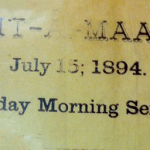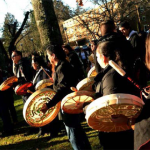Throughout the month of June, the Library will be celebrating Aboriginal scholarship, creativity, and intellectual traditions with its second annual Aboriginal (Un)History Month.
Featuring exhibits at the Irving K. Barber Learning Centre (IKBLC), Asian Library, and book displays at several library branches, the (Un)History month activities introduce ways UBC Indigenous scholars are bridging communities and transforming academic spaces through Indigenous approaches to research, pedagogy, and governance. It aims to educate and invite dialogue about (inter)relationships between place, recognition, and memory.
The month includes:
Engaging Indigenous Knowledge(s) installation – features six cases at the IKBLC level 2 foyer.
- Place, Belonging and Promise: Indigenizing the International Academy
- Being Well Being: The Institute for Aboriginal Health’s Teaching and Learning Garden
- Year of Indigenous Education
- Living Our Indigenous Languages
- Truth and Reconciliation in Canada
- Raven in the Library at Xwi7xwa
Indigenous cultures in Asia exhibit (Asian Library)
Iron Pulpit: Missionary Printing Presses in British Columbia exhibit (Rare Books and Special Collections, IKBLC Level 1)
- Featuring materials produced on missionary printing presses in British Columbia between the 1850s and 1910s, this exhibition looks at printed materials in context of Indigenous-Christian encounters, colonialism, and print culture in the province.
and Aboriginal literature displays in Education, Koerner, Irving K. Barber Learning Centre, Xwi7xwa and Woodward libraries.


For those interested in online resources,
- Aboriginal Business Education and Resources from the Small Business Accelerator program
- Aboriginal Law research guide
- Delgamuukw Resources guide – Aboriginal Land and Title case
- Delgamuukw Trial Transcripts
Posters are available as well (11×17) PDF.
For more information about Aboriginal (Un)History month activities, please contact Ann Doyle, Head, Xwi7xwa Library at ann.doyle@ubc.ca.
The University of British Columbia Point Grey campus is located on the traditional, ancestral and unceded territory of the Musqueam people. We thank Musqueam for its hospitality and support.